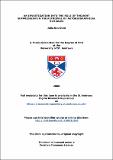Files in this item
An investigation into the role of thought suppression in the retrieval of autobiographical memories
Item metadata
| dc.contributor.advisor | Dritschel, Barbara | |
| dc.contributor.author | Neufeind, Julia | |
| dc.coverage.spatial | x, 246 | en |
| dc.date.accessioned | 2009-05-13T14:45:02Z | |
| dc.date.available | 2009-05-13T14:45:02Z | |
| dc.date.issued | 2008-11-27 | |
| dc.identifier.uri | https://hdl.handle.net/10023/686 | |
| dc.description.abstract | This program of research was designed to examine the role of thought suppression in the retrieval of autobiographical memories (ABMs). The principal theory proposed here is that thought suppression is an important mechanism in explaining certain ABM retrieval patterns relevant to trauma and self-harm. Study 1 examined the role of thought suppression as a correlate of ABM retrieval in a nonclinical student sample, and showed that higher levels of thought suppression were significantly correlated with the faster recall of negative episodic ABMs as well as the recall of fewer personal semantic memories. Study 2 used a suppression manipulation procedure designed to examine whether this was a causal relationship, and revealed that induced thought suppression directly led to a significant enhancement in the retrieval of negative episodic ABMs as well as significantly fewer overgeneral first responses to negative cues. Furthermore, the induced thought suppression also resulted in the recall of significantly fewer personal semantic memories. Together these results support the theory that thought suppression is an important factor in ABM recall. The enhanced recall of negative memories could be particularly important in individuals who are self-harming, suicidal and/or suffering from PTSD, as enhanced negative recall has previously been observed in these populations. In order to further examine how thought suppression affects ABM retrieval and whether the enhanced negative recall observed in Study 2 was a result of mood-congruent recall, Study 3 used a similar suppression manipulation paradigm to examine the effects of induced thought suppression on mood. The results suggested that the enhanced negative ABM recall was unlikely to have been a by-product of the suppression manipulation resulting in a more negative mood state. Finally, Study 4 examined the role of thought suppression and ABM recall in a clinical sample of self-harming adolescents (who also reported high levels of post-traumatic stress symptoms). The results showed that levels of thought suppression were significantly higher in the self-harmers than the control group, indicating that thought suppression is an important coping mechanism in self-harmers. Furthermore, in terms of the autobiographical memory retrieval, it was found that the self-harmers were significantly faster in their retrieval of negative episodic ABMs and recalled fewer personal semantic memories than the control group. Multiple regression analysis of the data revealed that thought suppression remained as the most important predictor of variability in negative episodic ABM retrieval and personal semantic memory retrieval, even when variability explained by symptoms of depression and PTSD was considered. This program of research extends current theories of ABM retrieval by identifying thought suppression as a cognitive mechanism that directly affects the retrieval of both episodic as well as personal semantic ABMs. The theoretical importance and clinical relevance of this program of research are discussed. | en |
| dc.format.extent | 994514 bytes | |
| dc.format.mimetype | application/pdf | |
| dc.language.iso | en | en |
| dc.publisher | University of St Andrews | |
| dc.rights | Creative Commons Attribution-NonCommercial-NoDerivs 3.0 Unported | |
| dc.rights.uri | http://creativecommons.org/licenses/by-nc-nd/3.0/ | |
| dc.subject | Autobiographical memory | en |
| dc.subject | Thought suppression | en |
| dc.subject.lcc | BF378.A87N4 | |
| dc.subject.lcsh | Autobiographical memory | en_US |
| dc.subject.lcsh | Thought suppression | en_US |
| dc.title | An investigation into the role of thought suppression in the retrieval of autobiographical memories | en |
| dc.type | Thesis | en |
| dc.type.qualificationlevel | Doctoral | en |
| dc.type.qualificationname | PhD Doctor of Philosophy | en |
| dc.publisher.institution | The University of St Andrews | en |
This item appears in the following Collection(s)
Except where otherwise noted within the work, this item's licence for re-use is described as Creative Commons Attribution-NonCommercial-NoDerivs 3.0 Unported
Items in the St Andrews Research Repository are protected by copyright, with all rights reserved, unless otherwise indicated.


